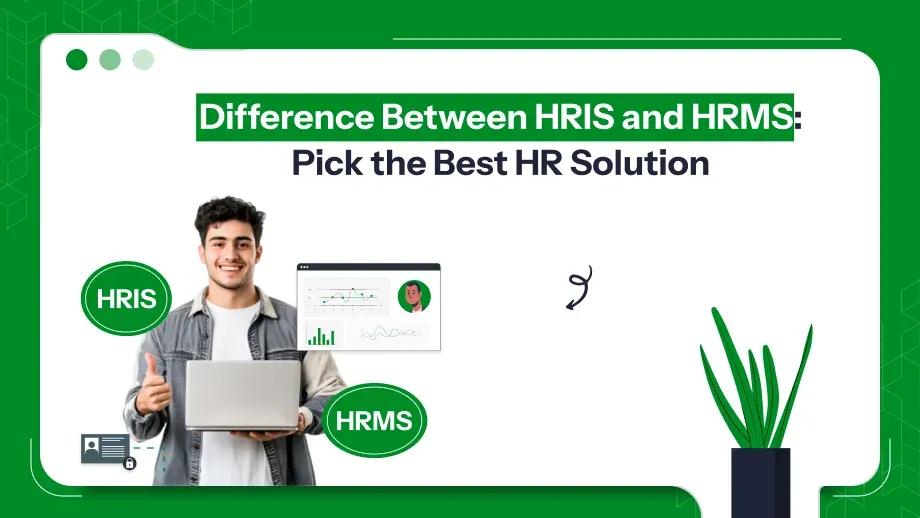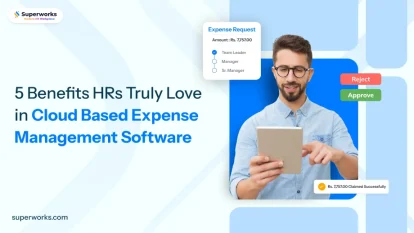
Human Resource Management has seen immense change with the emergence of advanced technology. Today’s businesses require effective solutions in handling complex HR operations. Two such prominent systems—HRIS and HRMS—are leading this revolution. What’s the major differentiator between HRMS and HRIS software? This article will give you a deep knowledge of these tools, the benefits they provide as well as the option that is most suitable for your needs.
What is HRIS and HRMS?
To comprehend the distinction between these two terms we must first be aware of what they mean:
HRIS (Human Resource Information System)
HRIS is a software program that focuses on important HR duties that concern the employee’s records and payroll and also compliance. It focuses primarily on data storage and administrative efficiency. The goal of HRIS is more related to streamlining operations, making sure that precise information is available while reducing the number of workers who are required to perform manual work.
HRMS (Human Resource Management System)
HRMS offers more beyond the fundamental functions that are expected of an HRIS It includes important aspects like the management of employee performance analytics of the workforce as well as the employee’s engagement. This provides a comprehensive method of managing HR considering the needs of the organization.
Core Functions of HRIS
HRIS provides robust solutions for managing employee information and ensuring compliance. Some key HRIS functions include:
1. Employee Record Management
-
- Storing employee details such as demographics, job roles, and performance history.
- Ensures data security and easy retrieval.
2. Payroll and Benefits Administration
-
- Reduces the chance of errors and assures the compliance of labor laws.
3. Compliance Tracking
-
- Tracks compliance with employment laws and regulations.
- Generates accurate reports for audits.
4. HRIS Employee Portal
-
- Provides employees with access to their records, benefits, and leave applications.
Core Functions of HRMS
HRMS combines the basic features of HRIS with added capabilities, making it a more holistic HR solution. Some of its notable features include:
1. Recruitment and Onboarding
- Automates the posting of job ads, applicant monitoring, and onboarding process.
- It enhances the user experience and cuts down on hiring time.
2. Performance Management
- Tracks employee performance against KPIs.
- Provides insights into training and development needs.
3. Employee Engagement
- Offers tools like surveys and feedback systems to improve workplace satisfaction.
- Promotes a positive organizational culture.
4. Cloud-Based HRMS
-
- Facilitates remote access and scalability through cloud based HRMS technology.
- Ideal for businesses with distributed teams.
Struggling to decide between HRIS and HRMS?
Let us guide you! Get the right HR solution to empower your business.
The Right Choice
This is a brief guideline to help you make the right decision:
| Criteria |
HRIS |
HRMS |
| Organization Size |
Small to Medium |
Medium to Large |
| HR Focus |
Administrative Efficiency |
Strategic Workforce Management |
| Features Needed |
Core HR Functions |
Comprehensive HR Suite |
| Budget |
Cost-Effective |
Higher Investment, Long-Term ROI |
| Technology |
Basic Integration |
Advanced Tech Integration |
| Future Growth Plans |
Minimal Scalability |
High Scalability |
Key Differences Between HRIS and HRMS
1. Scope of Features
- HRIS: The HRIS focuses on core HR functions like payroll, employee record management, and compliance reporting. It primarily streamlines administrative tasks, making it ideal for handling routine HR processes.
- HRMS: HRMS payroll software in india encompasses everything an HRIS and HRMS offers but adds advanced features like recruitment, performance management, employee engagement, and analytics. It takes HR management a step further by supporting strategic decision-making.
2. Employee Experience
- HRIS: Designed mainly for backend operations, HRIS has limited interaction with employees. Its primary purpose is to provide HR teams with efficient tools to manage data.
- HRMS: HRMS stresses an improvement in the experience of the employee. Self-service portals, engagement tools, as well as feedback mechanisms would help in better employee-employer communication.
3. Advanced Analytics
- HRIS: Provides basic reporting functionalities, which are sufficient for generating compliance and payroll-related reports. However, it lacks advanced analytics capabilities.
- HRMS: It incorporates predictive analytics and workforce planning. Dashes and data visualization further enable HR leaders to use data-driven decisions through these features.
4. Integration with Technology
- HRIS: Offers limited integration with newer technologies. Though functional in core HR operations, advanced technologies such as AI and machine learning may not be supported.
- HRMS: Having high technology, HR software in India, including HRMS, uses cloud computing solutions, AI, and automation for optimizing HR functions. Its integration with external systems makes it a more dynamic solution.
5. Ideal Use Cases
- HRIS: It specializes in core HR operations: payroll, compliance, and employee data management. It can be best suited for small-scale organizations to reduce more time on administrative tasks.
- HRMS: It suits an organization that requires a strategic approach towards HR for any organization. It supports everything from recruitment to employee engagement, making it suitable for companies with comprehensive HR needs.
Advantages of HRIS
HRIS provides numerous benefits, particularly for businesses looking to streamline their administrative functions:
1. Efficiency and Accuracy
- Automates repetitive tasks, decreasing the chance of errors, and also slashing time.
2. Cost-Effective
- Affordable to small businesses.
3. Compliance Assurance
- Simplifies compliance tracking with real-time updates and reports.
4. HRIS Software Options
Advantages of HRMS
HRMS is a strong tool for an organization to control its workforce more strategically.
Its benefits include:
1. Enhanced Employee Engagement
- Tools like surveys and recognition systems improve job satisfaction.
2. Workforce Planning
- Advanced analytics help identify skill gaps and forecast future workforce needs.
3. Scalability
- Perfect for businesses growing and requiring a flexible system.
4. HRMS SaaS Solutions
-
- Subscription-based models make HRMS saas accessible for businesses of all sizes.
Choosing Between HRMS HRIS
Factors to Consider:
1. Assess Your Organization’s Size
- Small to Medium-Sized Businesses: If your company primarily needs solutions for administrative tasks like payroll, compliance, and employee record management, the best HRIS software is likely sufficient. Its streamlined functionality caters to businesses with straightforward HR needs.
- Big Business: Organizations with complicated HR operations and strategic objectives will benefit much from the comprehensive capabilities of an HRMS. Features like performance management, analytics, and tools for employee engagement make it more suitable.
2. Define Your HR Objectives
- Prioritize Administrative Efficiency: Focus on Administrative Efficiency: If you are looking to enhance core HR tasks like the tracking of compliance and payroll Then HRIS and HRMS are the best options.
- Strategic Workforce Management: If you are looking to enhance customer experience, boost the engagement of employees, and utilize analytics to make decisions, then HRMS can be a good choice.
3. Consider Your Budget
- HRIS: It is the most budget-friendly for companies with strict budgets, and it returns significant ROI through the automation of basic HR tasks.
- HRMS: This requires more investment during implementation but is all worth it to businesses that would want to give center stage to HR strategy.
4. Evaluate Scalability
- HRIS: Suitable for businesses with steady operations and minimal plans for expansion. It offers reliable tools for current needs but might lack the flexibility for scaling.
- HRMS: Designed to grow with your business, core HRMS can handle increasing employee counts, diverse locations, and evolving HR requirements.
5. Identify the Complexity of HR Needs
- Basic HR requirements: It is the best choice to utilize HRIS and HRMS in business requirements that only require the administration of data as well as compliance.
- More complex HR requirements: When your HR department includes recruiting and the onboarding process, planning for the workforce, as well as employee engagement, HRMS might be the perfect solution to meet your requirements.
6. Evaluate Technology Requirements
- HRIS: If your company isn’t relying on a lot of advanced technologies, and only requires basic cloud or on-premise services HRIS and HRMS are the best choice for you. task.
- HRMS: For those businesses that incorporate AI and machine learning as well as cloud-based systems, HRMS is the system that is the most effective. It provides seamless connectivity between various platforms and tools.
Conclusion
The main difference between HRIS the HRMS is their scope of features, applications, and scope. HRIS and HRMS has its focus on the administration efficiency of an organization. However, HRMS emphasizes the strategic approach for the management of a workforce. Knowing your organization’s size, needs, and goals would assist you in making the correct choice according to your business objectives.
Find tools such as HRIS Management Software or HRMS for the perfect solution for your HR operations. Whether you choose one or the other, integrating advanced HR technology will greatly improve the efficiency of your organization and enhance your employees’ satisfaction.









